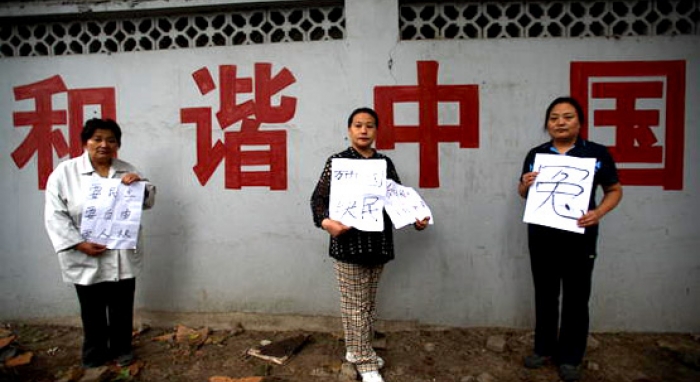(Geneva) – China must end restrictions on the formation of women’s rights NGOs, prevent and ensure accountability for reprisals against women human rights defenders, and abolish the use of ‘black jails’ which are used to disproportionately imprison women petitioners, the International Service for Human Rights said in response to a UN report issued today.
The UN committee focusing on the rights of women has expressed its grave concern to the government of China over undue restrictions on the work of women’s rights organisations in the countryand called for the protection of women human rights defenders.
The body of independent experts conducted a full-day review of China’s compliance with the UN Convention on the Elimination of Discrimination Against Women on 23 October 2014.
In its concluding observations, just issued, the Committee expressed concerns over allegations by some NGOs that reports submitted for the Committee’s consideration had been censored by State agents.
‘Civil society has the right to unhindered access to the UN. This naturally includes the right to submit information directly to human rights experts with the expectation that it is not tampered with,’ stressed Michael Ineichen of the International Service for Human Rights. ‘These allegations are serious and need to be promptly investigated to ensure that such practices stop,’ he added.
The Committee rightly identified the need to review highly restrictive national legislation on the formation of NGOs as one of the key contributing factors that prevent and undermine the operation and independence of civil society in China.
‘The government of China needs to ensure that civil society organisations, including women’s rights NGOs, can register directly without requiring sponsorship from State agents’, said Ms Pooja Patel, of the International Service for Human Rights.
The Committee on the Elimination of Discrimination Against Women was further concerned that some NGO representatives from China feared reprisals as a result of their participation in China’s review in Geneva. In this regard, the Committee called on the government of China to ‘take all necessary measures to protect women human rights defenders, including those who have provided information to the Committee’.
This echoes the call made earlier this year by the UN Committee on Economic, Social and Cultural Rights, which reminded China of its obligation under international law ‘to protect human rights and labour activists, as well as their lawyers, against any form of intimidation, threat and retaliation’. It also follows decisions by the Human Rights Committee and the meeting of Chairpersons of UN treaty bodies to step up efforts to combat reprisals.
ISHR welcomes the increasing awareness and sensitivity by the UN independent experts to the genuine concerns of human rights defenders regarding actual or potential reprisals as a result of their work with the UN.
‘However, since the death of Ms Cao Shunli in March – as a result of the denial of adequate health care while in detention – no efforts have been made by the Chinese government to hold perpetrators accountable, and the systematic practice of harassment and intimidation against human rights defenders cooperating with the UN continues,’ highlighted Ms Eleanor Openshaw of the International Service for Human Rights.
In addition to expressing concern at impediments to the establishment and operation of NGOs, together with repreisals against those who cooperate with the UN, the Committee also expressed its concern regarding unregulated detention facilities in China (‘black jails’) where women petitioners are alleged to be disproportionately detained. Though the government refuted such allegations and insisted that detention facilities were not permitted to operate outside of the law, rights groups have documented evidence of their existence.
‘We strongly urge the government of China to act on the Committee’s recommendations to immediately abolish ‘black jails’, and to penalise perpetrators including non-State actors,’ said Ms Patel.




